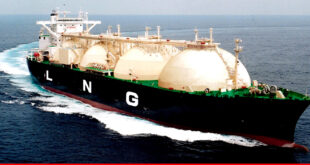It seems there is a deliberate attempt to create justification for the import of Liquefied Natural Gas (LNG) and bid farewell to Iran-Pakistan (IP) gas pipeline project. This lobbying is being done on the behest of those who have been opposing the project for one or the other reason. The bottom line is to keep Iran and Pakistan at a distance and the efforts have been further enhanced by creating border rifts between the two countries.
To begin with one has to find the reasons behind much talked about shortage of gas in the country. It is being said that the country face shortage of 2,000mmcfd. Some of the experts say pointblank are of that the shortage is being created to justify construction of billions of dollars LNG terminal and supporting infrastructure. These experts even go to the extent of saying that the much talked about shortage can be overcome simply by ending ongoing litigation of a few newly discover mega size gas fields and not diverting gas to power plants. Burning gas in power plants is often termed burning dollars for cooking food. Most regrettably running power plants and boilers of industrial units is the worst utilization of this best gift of God to Pakistan. Ideally Pakistan should have been generating electricity from hydel projects and coal fired power plants.
The premise that LNG is a substitute for furnace oil is also incorrect, simply because of the price of LNG, cost of infrastructure to be incurred in foreign exchange and huge losses in case transmission lines are blown up. On top of all the wired talk is going on without the realization that even if Pakistan decides to import LNG today, commencement of work will not be possible without achieving financial close. Even after commencement of construction it will take three years, at least to construct the infrastructure for handling and storing gas.
According to a newspaper report, since 2006 Pakistan has been making unsuccessful attempts to import LNG. The country has already entered into negotiations with Qatar for the import of LNG but before that it needs to set up a terminal. Sui Southern Gas Company (SSGC) and ETPL have already negotiated LNG Services Agreement under which SSGC will pay US$0.66 per million British thermal unit charges to ETPL. The contract will be awarded for a period of 15 years and on the basis of ensured import volumes, the country will pay US$1.4 billion to the company during 15 years, roughly US$93 million per annum. The company is required to set up the terminal within 335 days of the signing of the contract. It will have to pay US$150,000 per day penalty if it fails to meet the deadline. However, if the government fails to bring supplies after the completion of the project, it will have to pay ETPL the guaranteed amount.
Keeping all the things aside there seems gross lack of understanding among various ministries. Finance Minister, Ishaq Dar called a meeting of Economic Coordination Committee (ECC) of the Cabinet to consider a proposal of awarding the contract for setting up a terminal for handling imported LNG. The ECC had to defer summary approval after the Law Secretary disclosed that the Petroleum Ministry did not send a summary to his ministry. However, it was decided to send the summary to Prime Minister Nawaz Sharif for approval of US$1.4 billion project.
According to informed sources, Secretary Ministry of Law and Justice, Barrister Zafarullah Khan, questioned the authority of the ECC in taking decisions on matters, which were purely commercial in nature. He also highlighted that after the 18th Amendment in the Constitution, the ECC cannot direct the Oil and Gas Regulatory Authority to give policy guidelines on any matter. Such powers rest with the Prime Minister.
While reviewing the project purely on economic ground, it also becomes evident that Pakistan will have to pay a phenomenal cost of around US$19 per mmbtu. There is also argument that the price, for imported LNG from Qatar, being indexed to Brent Crude Oil for a long term contract is not the ideal. The critics say gas prices are expected to decrease as natural gas supply increases, due to shale gas being exported by the USA. This would be a legitimate argument if there was a huge difference in prices but studies project a difference of one to three US dollars between the prices of shale gas and Qatar gas. Qatar gas has a world monopoly in this field and cannot jeopardize its 70 mfpa market for Pakistan.
Decision to import LNG and construct terminal continues to be one of the most controversial issues in Pakistan’s energy plan. The project has been delayed for several years, much to the detriment of the progress of the country. Over the years energy deficit has increased alarmingly, consequently limiting economic growth and power supply to the nation. Pakistan should aim to have a self-sustainable gas sector as it did before, but this won’t happen overnight. The simple decision to import natural gas has taken seven years; one can only imagine how many years it would take for Pakistan to again become self-sustainable – Pakistan cannot afford to wait.
It has been reported by leading news media of India that some of the deals of LNG import are as high as US$19.25 per mmbtu. According to Economic Times, another mainstream Indian newspaper, from mid-November 2013, the country’s largest natural gas transporter Gail revised its re-gasified LNG prices to US$18 per mmbtu as against US$15.5 during July and August last year. Therefore, the perception that India imports LNG at US$10 – 12 per mmbtu from Qatar is not correct. Reportedly, India imports LNG from Qatar at US$16.19 per mmbtu (not including the additional terminal price) under deals signed much earlier, when LNG prices were lower.
 PAGE Blog Business Weekly Magazine
PAGE Blog Business Weekly Magazine
